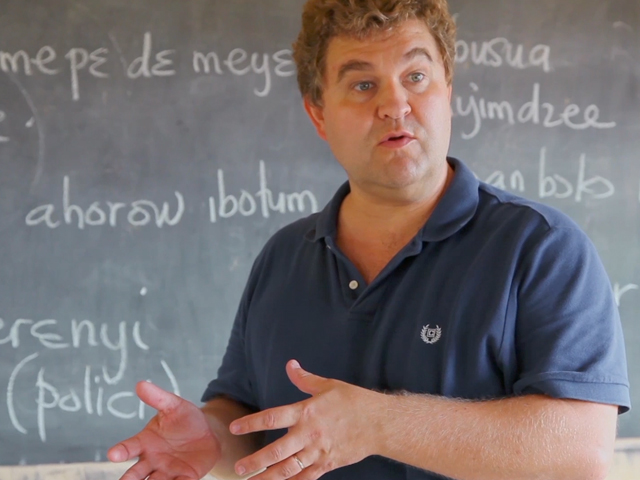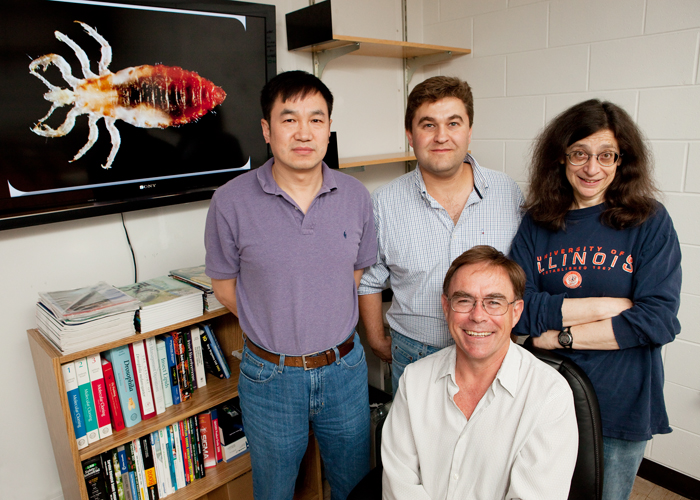Barry Pittendrigh honored with 2025 Lowell S. Hardin Award for Excellence in International Agriculture
Throughout his career, Barry Pittendrigh, John V. Osmun Endowed Chair in Urban Entomology in the Department of Entomology at Purdue University, has demonstrated an unwavering commitment to improving global agriculture through scientific innovation and international collaboration. In recognition of his contributions, Purdue’s College of Agriculture will present Pittendrigh with the 2025 Lowell S. Hardin Award for Excellence in International Agriculture.
Named in honor of Professor Lowell Hardin, the award recognizes Purdue Agriculture faculty members who have made significant international contributions in research, education and outreach.
A Lifelong Passion for Entomology and Science
Pittendrigh’s journey into entomology began at an early age. Growing up in Saskatchewan, Canada, he developed a fascination with mosquitoes and insect biology, which led him to participate in numerous science fairs throughout middle school and high school. From these efforts he was chosen, as one of two students in the country, to attend the Nobel Prize ceremony in 1986.
"I’ve always had an interest in entomology and enjoyed working with people in the field," Pittendrigh said. "I started with field ecology and later moved toward molecular biology. Throughout my career I have had a strong interest in both basic and highly applied research and development work."
Despite growing up in a city, Pittendrigh was deeply connected to the outdoors, frequently canoeing, camping, hiking, skiing and spending time on his relatives' farms. His love for science and nature led him to pursue an undergraduate degree in biology at the University of Regina, where he worked for entomologists. He later studied with Dick Shade and Larry Murdock during his time at Purdue as a master’s degree student.
A Chance Opportunity Sparks a Career in International Agriculture
Though his early research was funded by the National Institutes of Health and focused on molecular biology, Pittendrigh's path into international agriculture was shaped by an unexpected opportunity. While earning his PhD at the University of Wisconsin, he worked in Australia on pesticide resistance in key agricultural pests. After a postdoctoral fellowship at the Max Planck Institute in Germany, his first major international research trip as a Purdue faculty member took him to Kenya.
"A senior faculty member in the department was unable to take a trip to Kenya and asked me to go in his place," Pittendrigh recalled. "We were working on resistance management for Bt cowpea, and I grew attached to the work. What started as a side project quickly became a major component of my career.”
Transformative Research and Global Impact
Pittendrigh was a faculty member at Purdue from 2000 to 2008 and rejoined the faculty in 2021. Between 2008 and 2021 he held an endowed chair position at the University of Illinois and an MSU Foundations Professorship at Michigan State University. Since the early 2000s, Pittendrigh has led internationally recognized research on integrated pest management, biocontrol agents and sustainable agricultural practices. His work has directly benefited smallholder farmers in Africa, helping them reduce pesticide reliance, improve food security and implement cost-effective pest management strategies.
“Creating and managing organizations that literally span continents is not a simple matter,” said Robert A. Easter, president emeritus, dean emeritus and professor emeritus of animal sciences at Illinois. “Yet Barry has been able to effectively recruit and direct top talent to carry out necessary work.”
Pittendrigh also cofounded Scientific Animations Without Borders (SAWBO), a scalable digital learning initiative, with Julia Bello-Bravo while at Illinois. SAWBO takes teachable research for development innovations and places it into a format that is understandable by people of all literacy levels. Pittendrigh and Bello-Bravo work with scientific experts to both create and peer review this Extension content, which is available in more than 300 languages. During more than 15 years of field research they’ve documented how to scale the content across regions and countries.

SAWBO has allowed us to scale agricultural strategies and reach countless communities," Pittendrigh said. "It’s been rewarding to see how accessible education can empower farmers to improve their livelihoods whereby we can break past the barriers of literacy and language. The program has cracked the last-mile problem of knowledge delivery in rural areas in the global south."

Another major contribution has been Pittendrigh’ s leadership in the Human Body Louse Project, a large-scale initiative involving 60 researchers worldwide aimed at understanding insect biology and disease transmission. Pittendrigh led a five-year effort to get the genome project funded and make sense of the genome within the context of the body louse’s biology.
Pittendrigh was also the director of the Feed the Future Legume Systems Research Innovations lab, a seven-year program focused on improving legume cropping sytems through collaborations between the US and global scientific communities.
“Barry has demonstrated excellence in international discovery, instruction and engagement and is widely recognized for his leadership and contributions in international agriculture,” said Catherine Hill, professor and head of the Department of Entomology. “His record demonstrates his remarkable ability to launch and lead international programs that bring benefits and impact to farmers and communities around the globe.”
A ceremony and reception to honor Pittendrigh will be held on Wednesday, May 7, 2025, at Pfendler Hall, Room 241, from 2 to 4 p.m.
The Lowell S. Hardin Award for Excellence in International Agriculture was established in 2020 to honor the legacy of Professor Hardin, his contributions to international agriculture, and his many years of service in support of international activities in the Purdue University College of Agriculture. Lowell Hardin, Professor Emeritus of Agricultural Economics at Purdue University, was a great mentor, trusted confidant, wise counselor and innovative leader to many at Purdue. Born in 1917, Hardin graduated from Purdue in 1939 with a degree in animal science, attended graduate school at Cornell University and returned to Purdue in 1943 as a faculty member in the Department of Agricultural Economics. When Professor Hardin passed away in 2015, he left a legacy of loyal service, generous insight and shared knowledge to benefit humanity. This award honors that legacy and recognizes the achievements of those who follow in his footsteps.





